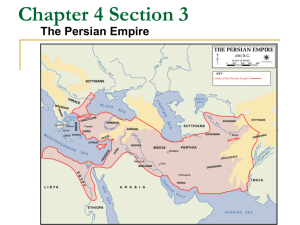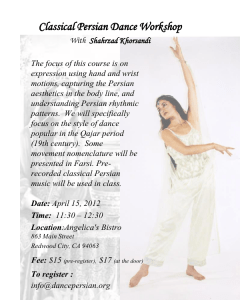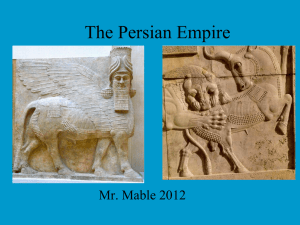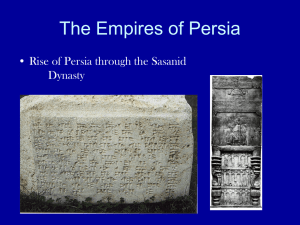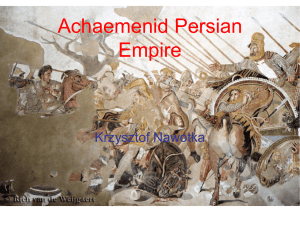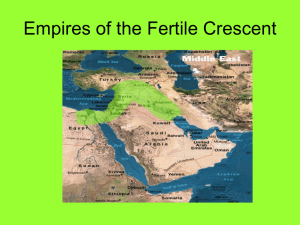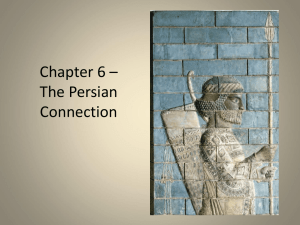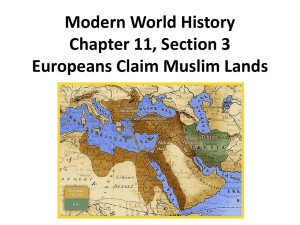The Persian Empire
advertisement
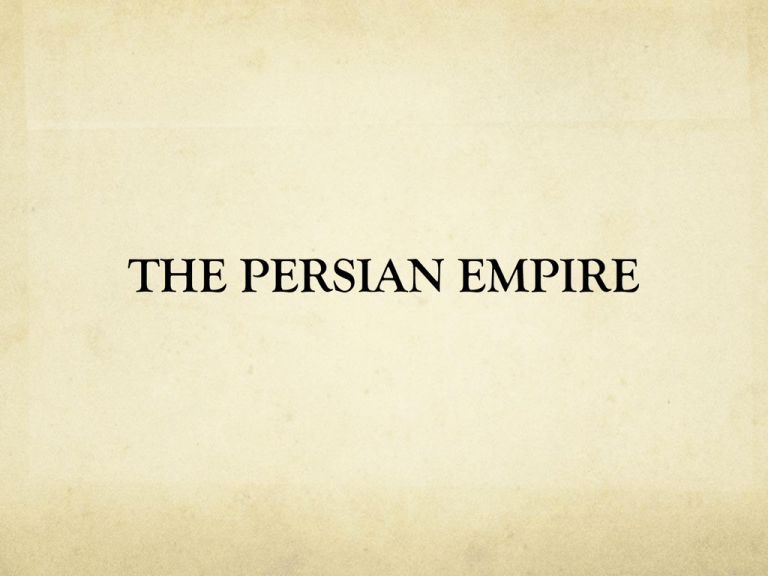
THE PERSIAN EMPIRE Persian Empire Little written evidence. Culture is viewed through Greek records. 6th Century BCE – Persians created the largest empire of its time Located in western Iran Recent archaeological discoveries and further analysis of written material from within the Persian empire has been used to supplement and correct Greek sources Persian Empire Links western, southern, and central Asia. This mediating position has had significant effects on its history and development Encompassed multiple ethnic groups and many forms of social and political organization Persian Empire Persian society was split up into 3 occupational classes. Warriors, were the dominant element. Landowning aristocracy of which the king was the most illustrious member. Magi, or priests, were ritual specialists who supervised the proper performance of sacrifices. Peasants, or the common people, were village based farmers and shepherds. Persian Empire Cyrus Redrew the map of west Asia Unified Persia 546 BCE defeated Lydia and Anatolia 539 BCE overthrew Neo-Babylonia Cyrus conquered Babylon in 539 BCE and showed respect to Babylonians by allowing them to retain their native traditions. Was this a good idea? Why or why not? Persian Empire Cambyses Son of Cyrus Explored Nubia and Libya Cruel and a madman according to the Greeks Practical and respectful according to the Egyptians Cambyses continued his father’s conquest and exploration throughout the Middle East. Would you believe the Greek or Egyptian point of view? Why? Persian Empire Darius I Distant relative Seized the throne in 522 BCE and extended Persian control as far eastward as the Indus valley and westward into Europe Considered the 2nd founder of the Persian Empire after Cyrus because he created a new organizational structure that was maintained and remained through two centuries of the empire’s existence Persian Empire Darius I (continued) Divided the empire into 20 provinces, each under the order of a Persian satrap, or governor Began construction of Persepolis, the ceremonial capital of the Persian Empire Persian Empire Satrap – Governor of provinces that were set up by Darius I Appointed position based on being related or connected by marriage to the royal family Tended to be a hereditary position Satrap’s autonomy increased the further away the province was from the empire Collected and sent tribute to the king The satrap was put into place to collect taxes and send them to the king to maintain the empire. What problems could arise? What effect did this have on the empire? Persian Empire (from yesterday’s discussion) Was there ever a satrap who rebelled against the king? Darius I Mixed his religious beliefs with his ideology to help solidify his rule and his claim to authority Persepolis was his large project to show off, but he was responsible for building the infrastructure of the Persian Empire. Roads, administrative buildings, etc. All were examples of Persia’s advanced engineering technology Made an attempt on Athens but failed, would be a precursor of future conflicts between the two regions Persian Empire Xerxes Son of Darius I Completed construction of Persepolis originally started by his father King from 486-465 BCE What is Xerxes best known for? Persepolis Persian Empire (review) Quick review of what we need to know King Cyrus the Great King Darius the Great Satrap Magi Xerxes Persepolis Zoroastrianism Ahura Mazda Persian Empire (review) 1. How did Cyrus and Darius administer their rule in the Persian Empire? 2. How did the Persian Empire rise from its Iranian homeland and spread to encompass diverse cultures? 3. Compare and contrast the Persian Empire and the Israelites. Zoroastrianism Religion of the Persian Empire under Darius I Great god of the religion was Ahuramazda World was created by Ahuramazda and the original state of perfection and unity had been badly damaged by the attacks of Angra Mainyu, the hostile spirit The struggle of good and evil plays out over thousands of years with good ultimately destined to prevail Humans are participants in this cosmic struggle and individuals are rewarded or punished in the afterlife Zoroastrianism (continued) Monotheistic, high ethical standards for humans, salvation, messiah Believed to have strongly influenced later religions such as Christianity and Judaism Zoroastrianism influenced later religions. How would a ruler benefit from adopting this type of belief system? How did followers of this type of belief system benefit? A document found at Persepolis, the magnificent ceremonial center built by Darius and his son Xerxes, expands on the qualities of an exemplary ruler. While it says it is the words of Xerxes, it is almost an exact copy of an inscription of Darius from nearby Naqsh-I Rustam, where Darius and other kings were buried in monumental tombs. “A great god is Ahuramazda, who created this excellent thing which is seen, who created happiness for man, who set wisdom and capability down upon King Xerxes. Proclaims Xerxes the King: By the will of Ahuramazda I am of such a sort, I am a friend of the right, of wrong I am not a friend. It is not my wish that the weak should have harm done him by the strong, nor is it my wish that the strong should have harm done him by the weak. The right, that is my desire. To the man who is a follower of the lie I am no friend. I am not hot-tempered. Whatever befalls me in battle, I hold firmly. I am ruling firmly my own will. The man who is cooperative, according to his cooperation thus I reward him. Who does harm, him according to the harm I punish. It is not my wish that a man should do harm; nor indeed is it my wish that if he does harm he should not be punished. What a man says against a man, that does not persuade me, until I hear the sworn statements of both. What a man does or performs, according to his ability, by that I become satisfied with him, and it is much to my desire, and I am well pleased, and I give much to loyal me. Of such a sort are my understanding and my judgment: if what has been done by me you see or hear of, both in the palace and in the expeditionary camp, this is my capability over will and understanding. This indeed my capability: that my body is strong. As a fighter of battles I am a good fighter of battles. Whenever with my judgment in a place I determine whether I behold or do not behold an enemy, both with understand and with judgment, then I think prior to panic when I see an enemy as when I do not see on. I am skilled both in hands and in feet. A horseman, I am a good horseman. A bowman, I am a good bowman, both on foot and on horseback. A spearman, I am a good spearman, both on foot and on horseback These skills that Ahuramazda set down upon me, and which I am strong enough to bear, by the will of Ahuramazda, what was done by me, with these skills I did, which ahuramazda set down upon me. May Ahuramazda protect me and what was done by me. Looking at the document of Xerxes from Persepolis, what qualities are desirable in a ruler? What is the Persian concept of justice?

